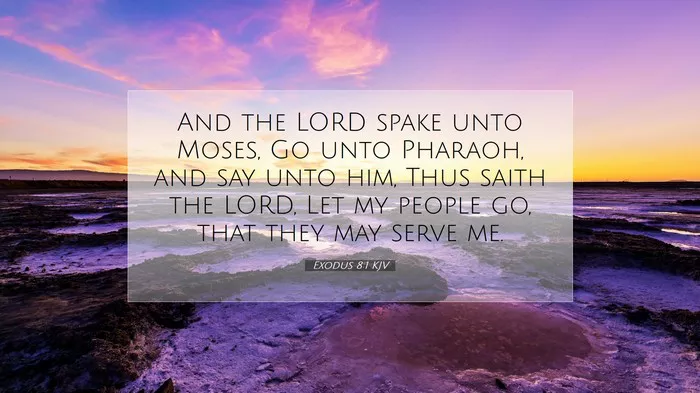Read the Daily Bible Verse – Exodus 8:1 To Strengthen Your Spiritual Journey.
Exodus 8:1 (KJV) states:
“And the Lord spake unto Moses, Go unto Pharaoh, and say unto him, Thus saith the Lord, Let my people go, that they may serve me.”
This verse is a pivotal part of the biblical narrative during the ten plagues of Egypt. It showcases God’s authority over Pharaoh and His determination to free the Israelites from slavery. This article explores the context, meaning, application, and modern relevance of this verse.
The Context of Exodus 8:1 (KJV)
Historical Background
The Book of Exodus describes the journey of the Israelites from slavery in Egypt to freedom under God’s divine guidance. Chapter 8 falls in the middle of the narrative about the ten plagues, which were God’s acts of judgment against Pharaoh and the gods of Egypt.
Exodus 8:1 occurs after the first plague (the Nile turning to blood) and introduces the second plague (frogs). By this point, Pharaoh’s heart remains hardened despite witnessing God’s power. This verse reiterates God’s demand: the release of His people so they can serve Him.
The Role of Moses and Aaron
Moses, acting as God’s prophet, and Aaron, his spokesperson, confront Pharaoh repeatedly. Their mission underscores God’s justice, patience, and eventual wrath. Exodus 8:1 reflects God’s enduring patience, as He continues to offer Pharaoh opportunities to obey.
The Meaning of Exodus 8:1
A Direct Command from God
The verse is a clear instruction from God to Moses, emphasizing His divine authority. The phrase “Thus saith the Lord” asserts that Moses speaks on behalf of the Creator of heaven and earth, not as an independent leader.
The demand to “let my people go” is both a liberation command and a declaration of God’s ownership over the Israelites. They are not Pharaoh’s property; they belong to God.
Worship as the Purpose of Freedom
The phrase “that they may serve me” is crucial. God’s intent is not merely to free the Israelites from oppression but to restore them to their true purpose: worshiping and serving Him. Freedom in the biblical sense is not an absence of constraints but submission to God’s righteous rule.
Exodus 8:1 Application in Life
Spiritual Liberation
Exodus 8:1 reminds believers that God desires to free us from all forms of bondage, whether physical, spiritual, or emotional. Just as the Israelites were enslaved in Egypt, many people today are enslaved by sin, fear, or destructive habits.
This verse encourages individuals to seek God’s deliverance and embrace a life dedicated to serving Him. True freedom is found in living according to God’s will.
Obedience to God
Pharaoh’s repeated refusal to obey God’s command contrasts with Moses’ obedience in delivering the message. This highlights the importance of aligning ourselves with God’s plans, even when faced with resistance.
Comparison with Other Biblical Texts
Parallels in the Exodus Narrative
Exodus 8:1 echoes the earlier demand in Exodus 7:16:
“And thou shalt say unto him, The Lord God of the Hebrews hath sent me unto thee, saying, Let my people go, that they may serve me in the wilderness.”
The consistency of God’s command throughout the plagues shows His unwavering purpose. Each repetition also underscores Pharaoh’s increasing accountability for his disobedience.
Freedom in the New Testament
The call to freedom in Exodus finds its ultimate fulfillment in Christ. In Galatians 5:1, Paul writes:
“Stand fast therefore in the liberty wherewith Christ hath made us free, and be not entangled again with the yoke of bondage.”
Just as God liberated the Israelites, Jesus liberates believers from the bondage of sin, enabling them to serve God fully.
Modern-Day Relevance
Social Justice and Liberation
Exodus 8:1 has inspired countless movements for justice and freedom. From the abolition of slavery to civil rights struggles, the verse resonates with those seeking deliverance from oppression.
Christians are called to reflect God’s heart for justice, advocating for the liberation of the marginalized and oppressed in society.
Personal Reflection
In a personal sense, Exodus 8:1 invites believers to examine what holds them captive. It could be materialism, pride, or fear. The verse challenges us to surrender these to God and prioritize worship and service to Him.
Conclusion
Exodus 8:1 is a profound verse that speaks to God’s desire for His people’s freedom and devotion. It reminds us of His sovereignty, the call to worship, and the consequences of disobedience. Whether viewed in its historical context or applied to modern life, this verse carries timeless truths about liberation, obedience, and purpose.
For believers today, Exodus 8:1 serves as a call to examine our lives, align with God’s will, and embrace the freedom found in serving Him wholeheartedly.
Exodus 8:1 Commentary
Theological Insights
Commentators often highlight the dual themes of divine sovereignty and human resistance in Exodus 8:1. God’s authority is absolute, but He allows Pharaoh the choice to obey or rebel, demonstrating both His power and His patience.
The Role of Worship
Exodus 8:1 emphasizes that worship is central to our relationship with God. The Israelites’ freedom was not an end in itself but a means to fulfill their purpose as God’s chosen people.
Pharaoh’s Hardened Heart
This verse also sets the stage for the recurring theme of Pharaoh’s hardened heart. His refusal to heed God’s command illustrates the dangers of pride and rebellion.
You Might Be Interested In:


